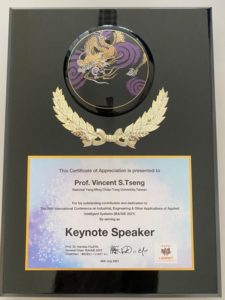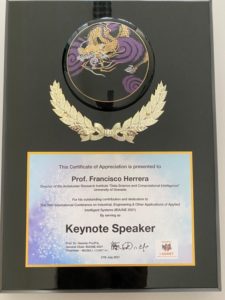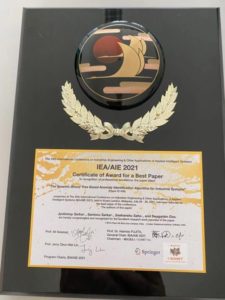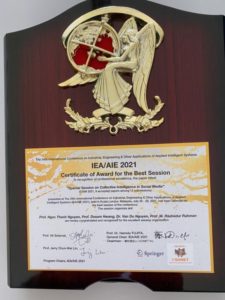Advances in Theory and Applications of Artificial Intelligence
Hamido Fujita*1, Ali Selamat2, Jerry Chun-Wei Lin3, Moonis Ali4
1i-SOMET Incorporated Association, and Iwate Prefectural University, Morioka, Japan
*[email protected]
2 Universiti Teknologi Malaysia, Kuala Lumpur, Malaysia
3 Western Norway University of Applied Sciences, Bergen Norway
4Texas State University, San Marcos, Texas, USA
This year the 34th edition of the IEA/AIE (International Conference on Industrial, Engineering and Other Applications of Applied Intelligent Systems), abbreviated as IEA/AIE 2021, was held in Kula Lumpur, https://ieaaie2021.wordpress.com/ from the 26th to the 28th of July 2021. The IEA/AIE conference is a longstanding conference, held every year since 1988, which focuses on artificial intelligence and its applications. Over many years, the IEA/AIE conference has been held worldwide in more than twenty different countries.
The IEA/AIE 2021 conference is sponsored by the International Society of Applied Intelligence (ISAI) in cooperation with Springer, University Teknologi Malaysia, the i-SOMET incorporated Association, Association for the Advancement of Artificial Intelligence (AAAI) / Assoc. for Computing Machinery (ACM/SIGART), Austrian Assoc. for Art. Intelligence (OEGAI), IEEE, Catalan Assoc. for Art. Intelligence (ACIA), Graz University of Technology, Italian Art. Intelligence Assoc. (AIxIA), Iwate Prefectural University, Japan, Japanese Society for Art. Intelligence (JSAI), Lithuanian Computer Soc. – AI Section (LIKS-AIS), Spanish Society for Art. Intelligence (AEPIA), Soc. for the Study of AI and the Sim. of Behavior (AISB), Taiwanese Association for Consumer Electronics (TACE), Taiwanese Association for Artificial Intelligence (TAAI), Texas State University, USA , University of Klagenfurt, Austria.
This year, 145 papers were submitted to the conference. These papers were either submitted to the main track or a special session. Eight Special sessions were organized called: Special Session on Data Stream Mining: Algorithms and Applications (DSMAA 2021), Special Session on Intelligent Knowledge Engineering in Decision Making Systems (IKEDS2021), Special Session on Knowledge Graphs in Digitalization Era (KGDE2021), Special Session on Spatiotemporal Big Data Analytics (SBDA2021), Special Session on Big Data and Intelligence Fusion Analytics (BDIFA2021), Special Session on AI in Healthcare (AIH2021), Special Session on Intelligent Systems and e-Applications (iSeA), and Special Session on Collective Intelligence in Social Media (CISM 2021). An International Program Committee composed of 196 researchers from 38 countries was established. Each paper received at least three reviews following a double-blind peer review. Based on the reviewer’s recommendations, 87 full papers and 19 short papers were selected to appear in the conference proceedings published in two volumes in the Lectures Notes of the Artificial Intelligence series of Springer under the title: Advances and Trends in Artificial Intelligence: From Theory to Practice. Volume 1 (LNAI, volume 12798) https://link.springer.com/book/10.1007/978-3-030-79457-6 and Volume 2 (LNAI, volume 12799): in https://link.springer.com/book/10.1007/978-3-030-79463-7. Papers accepted by the conference cover both theoretical advances in artificial intelligence and applications of applied intelligence systems to solve real-life problems in all areas, including science, industry, engineering, robotics, and automation, finance and business, bioinformatics, medicine, cyberspace, and human-machine interactions, among others. Each paper was presented either in person or as an online presentation (for authors who could not attend the conference due to the coronavirus pandemic). Following the conference, papers that received excellent evaluations have been invited to submit an extended version for the “Best of IEA/AIE 2021” special issue in the Applied Intelligence journal.
It is worth mentioning that the IEA/AIE 2021 was running in the pandemic period imposed by COVID-19, in which participants were not allowed to travel overseas. We had online presentations organized on the webinar. Despite the time zone difference, we had a 98% attendance rate. Among the 106 papers published in Springer conference proceedings in two volumes, there were 101 papers presented online and five papers presented on the avenue. It was an excellent experience to notice that many participants were attending the presentations, and many sessions’ chairs were participating in the conference’s mandate regardless of the time zone differences making the event globally active.
Keynote Presentations
Two keynotes presentations were given by distinguished researchers who were recognized by presenting medals, shown in Fig.1. In “Data quality for learning: The case of the COVID19 prediction with RX”, Prof. Francisco Herrera, Director of the Andalusian Research Institute “Data Science and Computational Intelligence” (University of Granada) described a new research paradigm towards data quality which is the key to transform big raw data into quality knowledge and smart data called Deep Data for better quality and knowledge extraction. Prof. Herrera discussed in his keynote issues related to limitations of deep learning with data quality with a real example from named as Knife detection and Covid with RX detection using smart data net.
The 2nd keynote speaker was: Professor Vincent S. Tseng, from the Department of Computer Science, Director of the Institute of Data Science and Engineering, National Yang-Ming Chiao Tung University, Taiwan. He presented a talk on Broad and Deep Learning of Big Heterogeneous Health Data for Medical AI: Opportunities and Challenges; he outlined recent developments and ongoing projects on the topic of Medical AI, especially in intelligent diagnostic decision support and disease risk prediction by using various advanced data mining/deep learning techniques including image analysis (for medical images), multivariate time-series analysis (for vital signs like ECG/EEG), patterns mining (for EHR), text mining (for medical notes), sensory analysis (for sensory data like air quality), as well as fusion methods for integrated modeling. The conference provided two medals for both speakers, as shown in Fig. 1.


Fig.1 Recognition for the Keynote Speakers
Best Paper Awards
This year, three awards were given to reward the best contributions according to evaluation categories represented as a novelty, technical quality, and presentation. These awards were sponsored by Springer. Good nominations were selected based on the overall review scores, and then the final decision was made by an award committee. There was the best paper award from the main track IEA/AIE and one best session paper award selected from the eight special sessions. Authors received awards as a special frame made of glass, shown in Fig.2.
The “Best Paper Award of the main conference track” representing the best overall contribution was given to “d-BTAI: the dynamic-Binary Tree-Based Anomaly Identification Algorithm for Industrial Systems” by Jyotirmoy Sarkar Santonu Sarkar; Snehanshu Saha.
The recipient of the “Best special session Paper Award” was “Mood Support: A Personalized Intelligent Support Assignment System using an Agent-based Dynamic Configuration Model” by Azizi ab Aziz, Roqia Rateb, and Arya Bimo.
The medals are as shown in Fig.2.

Fig.2: The best papers award
The “Best Special Session Organizer Award” was given to Special session “Special Session on Collective Intelligence in Social Media (CISM 2021)” organized by, Prof. Ngoc Thanh Nguyen, Prof. Dosam Hwang, Dr. Van Du Nguyen, and Prof. M. Rashedur Rahman.

Fig.3 Recognition for the Best Session award
The 2022 Conference
Next year, the 35th International Conference on Industrial, Engineering, and Other Applications of Applied Intelligent Systems will be held in Kitakyushu, Japan, from the 19th to 22th of July 2022. We hope that the year 2022 will be LIVE and this pandemic vanished. As in previous years, contributions are welcome on theoretical aspects of artificial intelligence and applications of intelligent systems in innovative fields such as robotics, drone navigation, sensor networks medicine, and the Internet of Things. More details about next year’s edition can be found at: https://ieaaie2022.wordpress.com/.